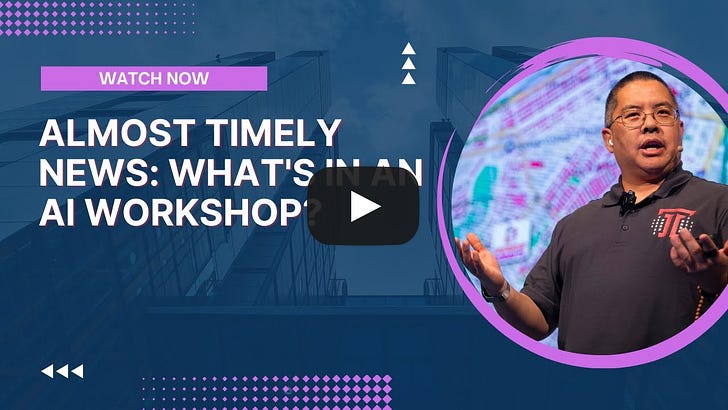|
Almost Timely News: 🗞️ What's In An AI Workshop? (2025-05-04) :: View in Browser
The Big Plug
👉 Check out my opening keynote talk from Content Jam 2025
Content Authenticity Statement
100% of this week's newsletter was generated by me, the human. Learn why this kind of disclosure is a good idea and might be required for anyone doing business in any capacity with the EU in the near future.
Watch This Newsletter On YouTube 📺

Click here for the video 📺 version of this newsletter on YouTube »
Click here for an MP3 audio 🎧 only version »
What's On My Mind: What's In An AI Workshop Anyway?
Happy Star Wars Day, fellow nerds.
I’m wrapping up five weeks of travel - San Diego, Wilmington, Miami, Chicago, and DC (I have a week break before Toronto and then two weeks until Phoenix) - and while the spring conference season has been a breakneck pace, it’s been incredibly enjoyable.
I just wrapped up my twice-yearly 2 day AI bootcamp with the Society for Marketing Professional Services (SMPS), the professional society for architecture, engineering, and construction (AEC) professionals. I’ve been doing these workshops for a couple of years now, and they’re so enjoyable because we get to dive deep into things I normally don’t have time to do more than gloss over in a keynote.
What’s always stunning to me is how fast AI changes. I refresh my training materials before each event, and this time around - even though it hasn’t been all that long in calendar time - I had to toss almost 50% of my materials because AI has changed so much.
I’ve been around for almost five decades now. In that time, I have never, ever seen a technology accelerate as fast as generative AI has in the last 3 years. The first inkling I had of generative AI was in 2021, when Eleuther.ai released its GPT-J-6B model. It was the first model I tried that generated coherent text that didn’t look like someone tripped and fell with a Scrabble tileset. In just four years, we’ve gone from bare coherence to reasoning models that can build deployable software in the browser and write entire, decent quality novels in one shot.
Change in AI is constantly accelerating, which is why a bootcamp can be useful, a way to get people up to speed with at least the basics. Now, I can't cram a workshop into a newsletter, but I can give you a sense of what I cover as an example of what you might want to look for in AI workshops.
Let’s take a tour of the workshop in brief, with the understanding that a 12 hour workshop isn’t going to fit in a newsletter.
Part 1: Workshop Prep
One of the main takeaways from the previous workshops I’d done is that a significant minority of participants really wanted to use the generative AI tools on the exercises, but they either didn’t have access to, or weren’t permitted to use their own company data with generative AI tools. Many of the exercises use data sources like Google Analytics, CRM data, competitive data, etc. As part of the prompt structures, and without that data, the prompts don’t work as well.
So the major change for the 2025 workshop is that I have a huge amount of synthetic data included with the workshop - a fictional company, its competitors, RFP examples, clients, RFP responses, competitive analysis, Google Analytics data, call center transcripts, email exchanges - basically, everything you would want in a comprehensive marketing analysis but you might not have, or it might take you far too much time to gather before or during a workshop.
The reception to this change was night and day. Far more people participated in the exercises than in past workshops; by my rough guesswork, about 2/3 of the room was actively participating, whereas in past workshops it was half or less. And more people came up to me during breaks to say thank you for including all the materials.
In conversation with some attendees at meals, one of them remarked how excited they were to get all this stuff, because they could go back to the office on Monday and show their manager how much stuff they got, tangible evidence and things they could bring back to share with their teams.
I’ve been including “stuff” in my keynotes all year, and with this workshop, it was even more valuable. So, more stuff it is. Attendees even get the synthetic, generated hold music from the workshop to keep as well.
Part 2: The Workshop
The two day workshop is structured based on the topics in my standard one hour keynote, expanded greatly and with dozens of exercises for people to actually try. Here’s the general layout:
Introduction and Basics
We talk through the major impacts of AI from recent studies; I cover some of Professor Ethan Mollick’s lab results along with a handful of other very recent research to set the table about why AI is important. There’s a strong undercurrent on social media of people claiming that AI has no impact, that it’s a fad, that the technology doesn’t work.
Nothing could be further from the truth. In fact, AI is becoming so alarmingly powerful that last year, I retired the old saw that “AI won’t take your job but someone using AI will”. That’s mostly untrue now. Can AI do your entire job the way you do it? No. Can it consume so many of your tasks that your position could be consolidated and eliminated? Yes. AI models like OpenAI o3, Google Gemini 2.5, and the upcoming DeepSeek R2 are so incredibly smart (properly prompted) that there are few tasks they can’t make serious contributions to.
Check out this ad I made for a fictional AEC firm in 38 minutes as an example of how fast AI is evolving:

After that, we look at the landscape, digging into the major classes of models and giving attendees the current short list of what to use. Spoiler: unless you have a specific, narrow use case, use a reasoning model of some kind. And local models are the only guaranteed private AI - and today’s local models like Qwen-3-30B-3AB (you can tell a marketer did not name that) are absolutely incredible.
We then cover how language models work, and dig into prompt frameworks like the Trust Insights RACE 2.0 Framework, CASINO Deep Research Prompt, and a Prompt Optimization Meta-Prompt that makes just about anything better. The Prompt Optimization Meta-Prompt is one of the AI Trinity of “special sauce” techniques that makes AI better, along with Knowledge Blocks and Prompt Libraries.
Knowledge Blocks
Knowledge blocks are a concept I came up with back in 2024. The Trust Insights RAPPEL Framework was an early attempt at addressing the lack of context in most prompts, and for the most part it worked well. But with the advent of tools like Deep Research tools, it was time to evolve past that.
Knowledge blocks are pre-compiled libraries of text that function as jump-starts for any prompt. You drop it in with your prompt, and your prompt is instantly, vastly smarter. You might, for example, have a knowledge block about who your company is and what you do, or how you do your marketing, or a summary of your quarterly results from your analytics dashboards. Whatever the case is, they should be thorough and rich - the average knowledge block for me is between 15-30 pages long of incredibly detailed information.
We spend time talking through the different ways to generate those, especially some fun techniques for unlocking internal information at an organization.
Generative AI Use Cases for Marketers
Similar to the course of the same name, about half of the workshop is spent here. The use cases for generative AI are literally infinite, so we look at the 7 categories of use cases and then bountiful examples and exercises for each.
Extraction: pull data out of other data
Classification: organize and categorize your data
Summarization: turn big data into small data
Rewriting: transform data from one form to another
Synthesis: aggregate small data into big data
Question answering: ask questions of your data
Generation: make new data
One of the key points in the use cases is that the order of these techniques matters; each use case category ladders up to make the next category more effective. That’s why generation is at the end - once you’ve mastered the basics of the first six categories, what and how you generate data with AI becomes vastly better.